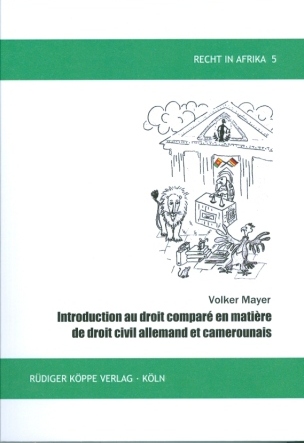
Introduction au droit comparé en matière de droit civil allemand et camerounais
Author: Volker Mayer. Series edited by: Gesellschaft für afrikanisches Recht / African Law Association (Germany).
Series: RiA Recht in Afrika Volume 5
2016213 pp.
Text language(s): French
Format: 148 x 210 mm
350 g
Paperback
€ 39.80
Buy 'Introduction au droit comparé en matière de droit civil allemand et camerounais' as a downloadable PDF document directly from our online shop »
Order 'Introduction au droit comparé en matière de droit civil allemand et camerounais' as print edition »
Within the framework of the cooperation agreement between the Université Catholique d’Afrique Centrale (Yaoundé, Cameroon) and the Technical University of Cologne (TH Köln), the book is intended as a contribution of the dialog about the institutional legal bases between the two countries.
After the introduction, the work starts with an explanation of the comparative law, presents its functions and methods and differentiates itself from other fields of law. That chapter serves to connect with the two countries and to understand of what exactly comparative law consists and what its basic objectives are. Afterwards, the two countries – Germany and Cameroon – are treated more accurately in the third chapter. There is a general overview concerning the legal areas in which not only legal, but also historical aspects are presented, insofar they prove to be significant for the legal development. At this point, the text highlights why the Cameroonian civil law is not that alien for Europeans – what you could think at the first glance of an African country.
Subsequently, the actual comparative legal analysis begins in chapter 4. That analyses investigates the legal contract in which the entering into a contract as well as the fulfillment of the contract is observed and furthermore, the analyses depicts two particularities. Hence, the chapter deals not only with important aspects of the commercial law, but also with the United Nations Convention on Contracts for the International Sale of Goods in comparison with the uniform regime of the distribution of the member states of the OHADA (Organisation for the Harmonization of Business Law in Africa), both of which show an increasing importance in the international context.
The subsections of the 4th chapter start in each case with a presentation of the legal, national situation in both of the two countries, followed by another comparison. The same goes for the next chapters that examine an unjust enrichment (chapter 5) and the tort law (chapter 6). At the end of the work, there is a summary of this introductory study of the comparative law between the German and the Cameroonian civil law, in which the results of the analyses are demonstrated and their importance for the legal transactions is described.
DESCRIPTION EN FRANÇAIS
Dans le cadre de l’Accord de coopération entre l’Université Catholique d’Afrique Centrale, Yaoundé / Cameroun, et l’Université Technique de Cologne (TH Köln), ce travail est destiné à contribuer au dialogue sur les fondements institutionnels et juridiques des deux pays.
Afin d’acquérir un lien avec les deux pays, mais aussi pour comprendre en quoi consiste exactement le droit comparé et quels sont fondamentalement ses objectifs, ce mémoire commencera tout d’abord au chapitre 2 par une explication du droit comparé en soi, exposera ses fonctions et méthodes et le délimitera par rapport aux autres domaines juridiques, avant de se pencher plus avant sur les deux pays – l’Allemagne et le Cameroun – au chapitre 3. L’aperçu général concernant les espaces juridiques présentera des aspects non seulement juridiques, mais également historiques dans la mesure où ils s’avèrent significatifs pour l’évolution du droit. À cet endroit, nous mettrons également en évidence pourquoi le droit civil camerounais, pour les Européens, n’est peut-être pas aussi étranger qu’on pourrait le penser à première vue d’un pays africain.
Après cela, l’analyse de droit comparé proprement dite commence au chapitre 4. Celui-ci étudie le contrat, aborde aussi bien la création de contrats que leur exécution et se penche sur deux particularités. Ainsi, ce chapitre traitera non seulement des aspects importants du droit commercial, mais aussi de la Convention des Nations Unies sur les contrats de vente internationale de marchandises comparée au régime uniforme de la vente des États membres de l’OHADA, qui présentent tous deux une importance croissante dans le contexte international.
Les sous-parties du quatrième chapitre commencent respectivement par un exposé de la situation juridique nationale dans chacun des deux pays, puis comparent ensuite ces situations nationales entre elles. Il en va de même pour les chapitres suivants, qui traitent de l’enrichissement sans cause (chapitre 5) et du droit de la responsabilité délictuelle (chapitre 6). À la fin du mémoire, cette étude introductive de droit comparé entre le droit civil allemand et camerounais fait l’objet d’une synthèse dans laquelle sont exposés les résultats de l’analyse réalisée et leur signification pour les transactions juridiques.
Under these links you will find further publications of the African Law Association (Germany):
Accompanying material:
- Die Landfrage in Simbabwe
(ISBN 978-3-89645-621-2 ) - Jahrbuch für afrikanisches Recht · Annuaire de droit africain · Yearbook of African Law
(ISBN 978-3-927620-66-7 ) - Jahrbuch für afrikanisches Recht · Annuaire de droit africain · Yearbook of African Law
(ISBN 978-3-927620-67-4 ) - Lokale Selbstverwaltung im Spannungsfeld von afrikanischer Tradition und europäischer Moderne
(ISBN 978-3-89645-623-6 ) - Oil and the Niger Delta People in International Law
(ISBN 978-3-89645-622-9 ) - Recht in Afrika · Law in Africa · Droit en Afrique
(ISBN 978-3-927620-68-1 ) - Rechtspluralismus in Äthiopien
(ISBN 978-3-89645-624-3 )
Cross-reference:
| « back | Print version | [top] |
 Books
Books Audio
Audio Biographies
Biographies Series
Series Festschrifts
Festschrifts Journals
Journals